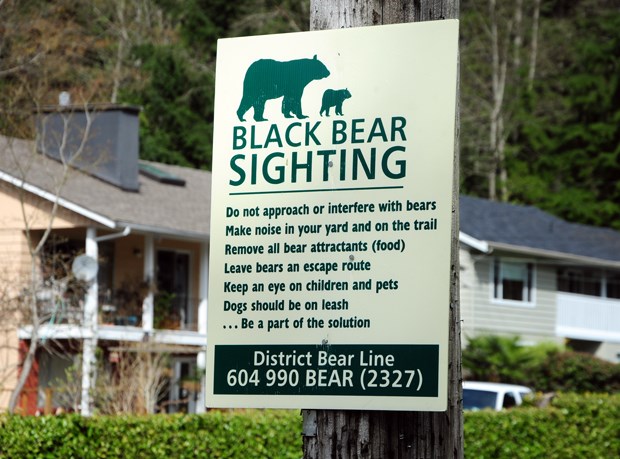Conservation officers are investigating reports that a black bear hanging around a West Vancouver neighbourhood was being regularly fed by people.
Officers were recently forced to destroy the bear over safety concerns, after the bear aggressively pursued hikers on two different occasions last month.
Conservation officers say the mature male black bear is the same bear that played a cat-and-mouse game with runner Chris Lubbell during a frightening standoff on the Lower Shinglebolt trail in mid-August. In that encounter, the bear pursued Lubell, sniffed at him and stood over top of him when Lubell fell trying to run away.
Conservation officers set a trap for the bear at that time but “we believe people tampered with our trap multiple times,” said Conservation Officer Simon Gravel, acting inspector for the Lower Mainland region.
The bear is believed to be the same animal captured on video at the beginning of August when it sniffed around a tent that had been pitched illegally by a camper near the Capilano River.
On Aug. 24, another hiker on the trail had a scary encounter with the bear, who wouldn’t back away, despite the efforts of four people, said Gravel.
“The hikers did everything right” – making themselves appear big and yelling loudly, but to no avail, said Gravel. “It was definitely a bear that was fed by humans,” he said, adding that kind of behaviour is only seen in animals that have been fed.
When bears learn that humans will provide food, they will return repeatedly, said Gravel. “A consequence of feeding a bear is very dramatic for its behaviour,” he said. “They become more and more persistent.”
Residents in the nearby British Properties neighbourhood told officers the bear was in the area daily and had figured out garbage pickup day. Officers determined there were few options, given the bear’s level of habituation to humans, said Gravel. The bear was caught in a trap and destroyed last week.
Conservation officers are now investigating reports from neighbours that the bear was being fed, said Gravel. If substantiated, the result could be a $345 ticket or a charge under the Wildlife Act.
Gravel said in most cases where bears have become used to humans and view them as a source of food, bears are destroyed rather than relocated. Habituated bears that are relocated usually return within hours, he said. That’s why conservation officers urge residents to keep their garbage secure and report any problem bears before the behaviour crosses the point of no return.



